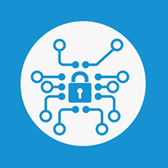
Some people mistakenly believe that online fraudsters only target major corporations. It’s a dangerous illusion as a business of any scale can become the victim of hackers. Identity theft can result in huge problems for both the company and its customers which is why online security should be the top priority for website or web app owners.
Types of Cyber Attacks
A cyber-attack is any deliberate activity aimed at gaining unauthorized access to a computer, computer system, network, website, and so on with the purpose of exposing, deleting, destroying, or stealing information. Cyber-attacks can be initiated by individuals or organizations and come in a variety of forms.
- APT or advanced persistent threats are large-scale attacks. These are well-prepared long-term campaigns aimed at getting access to certain kinds of information, which makes them hard to detect and prevent.
- DDoS attacks are deployed to overload the server of a website with queries. It makes the site’s normal functioning impossible.
- Malware is a piece of malicious software that gets installed on a computer without the user’s permission. Depending on its type, malware can affect certain files or the whole system. Common types of malware include viruses, Trojans, worms, spyware, and ransomware.
- Password attacks try to guess a password in order to gain unauthorized access to user accounts on various websites and web apps, including social media, payment systems, messengers, etc.
- Phishing is a popular form of cyber fraud. Hackers create a fake copy of a genuine app or website and user’s unknowingly enter their personal or financial information through the fake app. Needless to say, this information is stolen.
These types of attacks can completely ruin a business. For companies, cyber-attacks usually result in financial losses, destruction of reputation, and time losses caused by the need for recovery.
Basic Methods of Cyber Protection for Small and Medium-Sized Businesses
The importance of cyber security should not be underestimated, regardless of your company’s size. If you hire a development company to build your website or app, make sure they include proper security tools.
Here are some simple but effective methods of providing robust protection.
- A good antivirus or anti-malware suite is an essential solution for everyone. This is an inexpensive tool that protects from most existing and zero-day threats. You can even find some decent free options.
- This is an extra shield of protection from cyber-attacks, which minimizes the risk of unauthorized access. Some anti-malware suites come with a built-in firewall.
- Data backup. This is an important precautionary measure that helps you recover faster in case you fall victim to a cyber-attack.
- HTTPS encryption. This is the way to encrypt and protect user credentials, their personal and financial data. The websites using this type of encryption get SSL-certificates, which serve as proof of the site’s security and reliability.
- Verification Value. This is a tool used mainly for credit card protection (card verification value or CVV). It comes in the form of a 3- or 4-digit code printed on the backside of cards and serves as an extra layer of protection.
- Wi-Fi security is crucial for preventing sensitive data leakage. It is obtained through the use of VPNs, controllers of network access, and firewalls.
- The last but not the least is mobile security. Mobile apps are protected with advanced methods of encryption.
Real-Life Examples of Online Security Solutions for Business
If you want to provide a decent level of cyber security without major time and money investment, you can try one of the ready-made security solutions for business. Here are some popular and affordable options to choose from.
- CloudFlare – This is an inexpensive suite that includes tools for automatic detection of malware and cyber-attacks, including DDoS. The software blocks potential threats and provides reports of blocked attacks.
- Lookout Mobile Security – As the name implies, this suite is designed specifically for the protection of mobile devices. It protects from various forms of malware, prevents data leaks, and helps you comply with safety rules and requirements.
- Random.org – This is not a security suite. Random.org is a generator of reliable passwords, which can be used for companies of any size. One great thing about this tool is that it is available for free.
- Comodo – This is a well-known provider of security software. It offers various solutions for data protection at the enterprise level. It also has antivirus in free and premium editions.
- StaySafeOnline.org – This service by NCSA offers a pool of useful security tools for businesses. It helps to build reliable protection from malware, minimize the risks of data leaks, and work out security strategies for employees.
Tips on Cyber Threats Prevention
Of course, it’s impossible to predict and prevent 100% of cyber threats. That said, one can minimize the risk of being affected by following some simple tips.
- Make sure all your software is regularly updated. When you use the latest version of the software, the risk of a security breach is minimized.
- Use complex passwords rather than simple ones. Use different passwords for different accounts and devices. Make sure a password contains lower case and capital letters, symbols, and numbers.
- Use a reliable antivirus or anti-malware suite for business.
- Protect your Wi-Fi networks by using a reliable firewall.
- Don’t forget about the need for regular data backup.
Prevention is the best approach when it comes to cyber security. It’s easier to take the necessary measures to prevent an attack than spend your time and money on recovering from one.
Author’s bio:
Maria Diachenko is a tech writer at Cleveroad, a mobile and web app development company. Maria enjoys making how-to tech guides, describing programming trends and IoT innovations.
